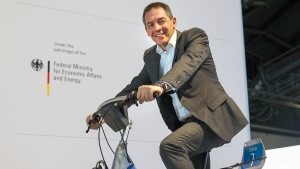e in Fahrrad is a rather unusual exhibit at a car show. The automaker ford The style break seems to disturb but little. Therefore, at its booth at the International Motor Show in Frankfurt, the company has also set up a pedal-powered two-wheeler in addition to a whole range of cars. It stands next to the latest versions of Ford’s long-running Fiesta model. When it comes to the automaker, bikes are supposed to stand like fiestas for the future he sees for himself.
![]()
Like other automakers, Ford also wants to transform itself from a pure vehicle manufacturer to a provider of all kinds of mobility services. And this should also include rental bikes, which can borrow the users of the in-house mobility application “Ford Pass” on their mobile phones. The Bikesharing project offers the automaker in co-operation with the DB Connect GmbH, a subsidiary of Deutsche Bahn. Today it already operates the railway’s own bike sharing service called Callabike. In a first step, the two partners are equipping the North Rhine-Westphalian cities of Düsseldorf and Cologne with 3,200 new rental bicycles in mid-October. The wheels are available to the approximately 36,000 users of the Ford Mobility App as well as the Callabike customers of DB Connect. Conversely, the Ford App users can now rent the 13,000 Callabike wheels in other cities.
Push on two wheels
For the acting since January Ford Head of Germany Gunnar Herrmann, the thrust into the two-wheeled world is not surprising, but “a fairly consistent development,” as he said at the Frankfurt auto show. “As a company, we do not just want to support mobility that is based on four wheels,” says Herrmann. It is the strategy of the company to show other ways of mobility, says Herrmann.
This includes, for example, the car-sharing service, which Ford has also been operating in Cologne and Düsseldorf for four years now. There are also partnerships with regional transport companies based there. For example, the Ford app also allows customers to buy bus and train tickets, reducing traffic to inner cities. “This is the point where many people are startled,” says Herrmann. “We do not want to take people away from the car. However, there are often more efficient ways to get around. “That’s why Ford has now set up a staff program that will bring one-third of the workforce in Cologne to work with public transport. If the company reaches the number, that would be more than 6,000 people coming by bus and rail. “At our employee meetings, traffic on the daily commuter route is the number one topic,” says Herrmann. Some employees have told him about up to an hour and a half of driving for a stretch. Meanwhile, according to Herrmann, this also affects Ford itself, and employees change jobs to have a shorter commute to work.
Cooperation with Streetscooter GmbH
The field for mobility services is currently being worked on by Ford on a relatively small scale. In the best case, the goal is to expand the offer. This also applies to a second project that the automaker had recently presented. Ford cooperates with the Streetscooter GmbH , a subsidiary of Deutsche Post DHL, which manufactures electric vehicles for the logistics company. Within the joint venture, around 150 pre-production vehicles will be created this year. By the end of the year production is to be ramped up to 2500 vans. What could become of the project is open, said Ford European boss Steven Armstrong. But when it starts to bloom, it could well have the potential to be exported to other parts of the world.
For the time being, the first electric vehicles will be built by Streetscooter GmbH in Aachen. In the longer term, electric mobility could also arrive at the Ford plant in Cologne-Niehl. Germany boss Gunnar Herrmann had said to take office, that the location should become a center of competence for electric mobility. According to him, Ford has already begun to make the change. Some of the 250 apprentices per year are already being prepared for occupational fields related to electromobility.
